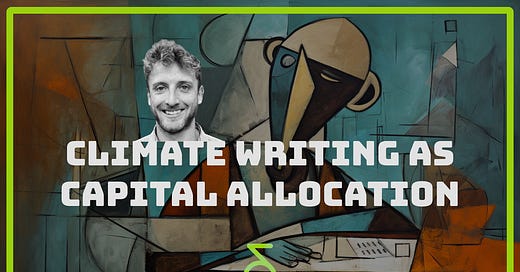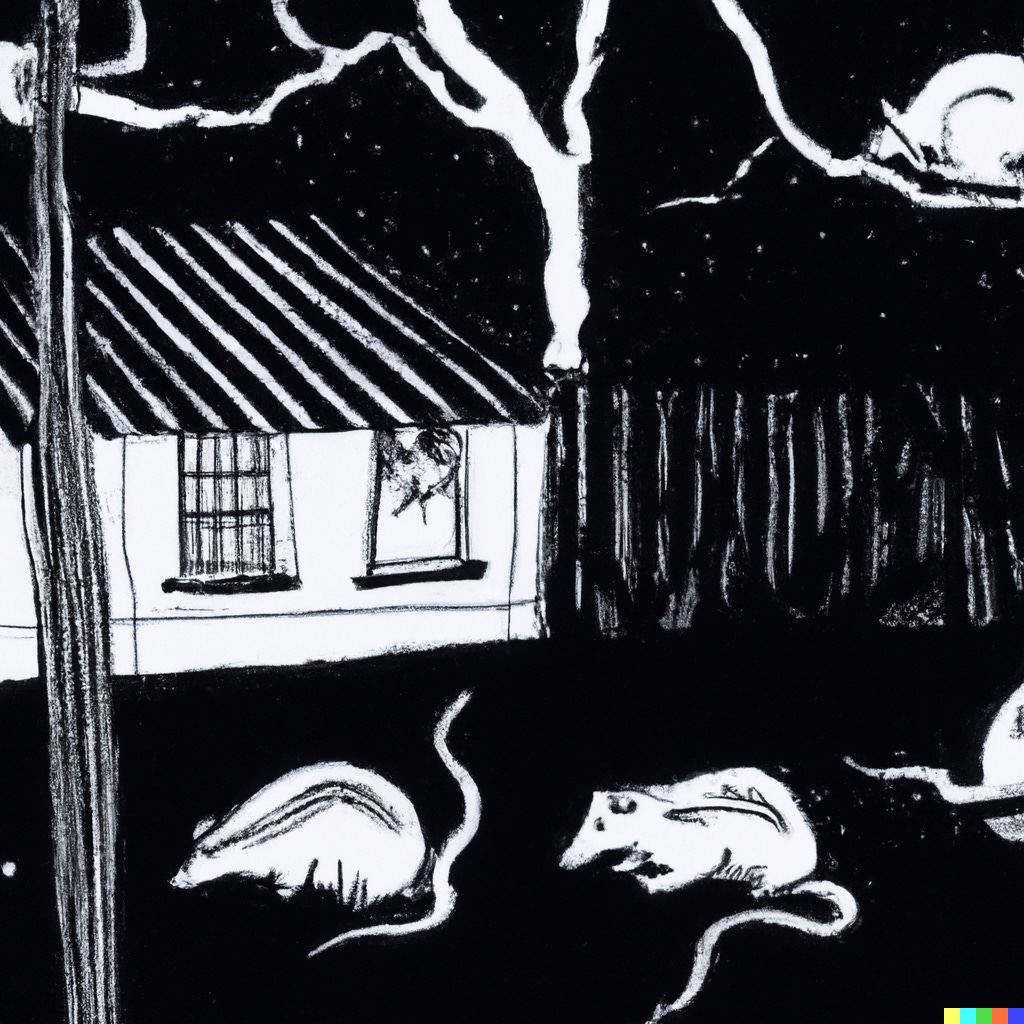Climate Writing as Capital Allocation
A conversation with Nick van Osdol about writing, media philosophy, and generating alpha ✍️
👋 Hello to 1,152 climate buddies 🌳
What is this? This newsletter explores topics in climate, energy, and everything in between.
Today’s interview with Nick van Osdol was a whirlwind of realness. He shared tons of great ideas about climate media, under-indexed topics, and what it means to be a human in the climate race 🌎
Without further ado, enjoy this wide-ranging conversation with nvo 👇
Climate Writing as Capital Allocation
By Art Lapinsch
How does a Creative Writing major from UCLA end up in Climate Tech? What was your journey from receiving the Clara Rusk Hastings Award to writing one of the most widely read newsletters in our industry?
My pivot into climate tech was intentional. My pivot into writing a climate tech newsletter and building a climate tech media brand was a happy accident.
Circa 2020, I took time out for a career transition. I'd worked as a management consultant, investor, and media operator. However, I felt unfulfilled by the work I'd been doing at the time and wanted to anchor my career with more of a concrete 'industry' focus.
I intended for this period to be one of 'wandering,' i.e., to learn open-mindedly and let myself feel into work and areas of study that would feel more aligned. I was interested in climate work for a variety of reasons. For one, the impact and global challenges inherent to 'climate' felt like they would offer some alignment with my values. I also saw a confluence of tailwinds forming in the space, ranging from the change in administration in the U.S. to significant private sector and entrepreneurial interest in seeding and starting climate tech businesses.
I started Keep Cool, my climate tech newsletter (and now, media brand), more as a vehicle to learn, to meet founders, to analyze companies, and to teach myself about what 'climate tech' even meant. I did not expect I'd do that for a long time; I expected I'd find a startup to work for.
That said, I realized a few things pretty quickly once I started:
By virtue of my creative writing background, my ability to synthesize information, and my ability to regurgitate it intelligibly for others, there was a market for what I was doing.
I was at the time (and still am, I might add) uniquely unsuited to the stillness and lack of external validation that a prolonged period of 'wandering' would require. So, I found myself quickly committing to diving deep into the climate tech space. The energy of others in the space was infectious, too. So I dove in headlong, even though I didn't expect to or intend to, per se. As many of us have likely found at one time or another, while I was consciously committed to one thing, I was unconsciously committed to another, namely staying in motion and 'producing' something of value. This is neither here nor there, but it led me to where we are now.
I realized climate tech was a rapidly growing, somewhat amorphous 'entity' that wasn't served well by other media offerings. So, there was a need for people to shepherd the narrative of this nascent industry in a positive direction. And early-stage companies in the space needed someone to write about them in an accessible, fun manner.
Fast forward three years or so, and I'm still at it. Much of that is thanks to my readers and to Adam Ryan and Becca Sherman, who were founding a new digital media company, Workweek, in 2021 and took an incredibly early risk in bringing me on full-time to grow my climate tech coverage and the Keep Cool brand as one of their first employees.
What does your day-to-day look like? What were your biggest learnings (writing-wise, industry-wise, etc.) since starting the Keep Cool newsletter?
I'll skip the industry-wise portion here; that's the content I bring to the fore in my work multiple times per week.
Writing-wise, there's very little to my process that's easily distilled. My day-to-day involves a lot of data and information intake:
I trawl Twitter and dozens of sources of data and news on climate tech and energy.
I talk to founders, investors, policymakers, and activists.
I consume lots of other climate tech and climate and energy media.
Then, I more or less let all of this information flood my mind.
I don't use notion or some other 'sophisticated' software stack to catalog everything. For my part, I think that gets in the way of letting the supercomputer that is your brain do what it's best at. If I were to take note of everything and try to draw connections between it all consciously, that'd be overwhelming, and it would get in the way of the more subliminal and 'behind-the-scenes' work my brain is perfectly evolved for, namely to ingest information, let it marinate, and then resurface what struck it as most salient.
That's probably the most woo-woo description of the creative process anyone's read recently, but it works for me. And wrestling with what's implied by that process is the biggest thing I've learned about writing since starting. Again, all of this is in my experience, but I have to trust the mystery of how my mind works to do a lot of the synthesis and creative work. If I get too consciously involved in trying to understand it, that disrupts the flow.
Of course, on the other end of the spectrum, there are very concrete things I do. I commit to writing a newsletter two times per week. There is habit formation and fluency that comes from that repetition. And if I'm writing about an early-stage climate tech company or a technology, there's a discrete set of information that people will want to know. And you can write a formulaic article and call it a day when you're pressed for time.
But now that there are umpteen climate tech newsletters, it isn't information or analysis that stands out. It's the voice on top of those pillars. And you won't find your voice by perfecting a notion workflow. Or even by rote repetition.
In a recent interview, I heard you say that "writing is a form of capital allocation." Please expand on this idea.
More specifically, attention is a form of capital allocation. There's a finite amount of attention that people can pay to things in the world, the same way there's some finiteness surrounding things like human capital (labor hours and people's expertise) and financial capital.
If I produce media that absorbs a certain amount of people's attention, it behooves me to be thoughtful about whether I'm directing people's attention toward something worthwhile.
I could write about every iterative EV battery manufacturing investment, but that could lead people to conclude that we're making a massive amount of progress holistically solving climate issues. In reality, there are thousands of other decarbonization challenges, many of which are underserved and undercovered, like, say, nitrous oxide emissions from fertilizer use, that people may never read an article about.
What's lost if I don't write the nitrous oxide article? There may be one reader in my audience of 20,000 who's uniquely well-suited to work on that problem. I don't know. Capital allocation is notoriously tricky and involves an incredible amount of tradeoffs at any given time.
In traditional finance, there are no perfect investors. Few investors repeatedly beat the market. I think about that a lot in terms of media.
Your job isn't to always serve something refreshing, inspired, and illuminating. But ideally, you provide some alpha, i.e., above-market performance, some of the time.
What is one thing that climate writers can learn from creative writers? Why is it important? What's an example?
You're operating in a world where people spend the vast majority of their time in three boxes:
They spend their time 'inside' their computers, which is one box 🖥️
They spend their time 'inside' their phones, a second box 📱
And they spend time inside their heads, the third box 🤯
With respect to boxes one and two, everything else in those boxes is inordinately optimized to occupy people's attention.
Question one to ask yourself is how do you compete with that? How do you craft a story in a way that stands out sufficiently from everything else that's being served in those boxes?
Then, the second question to ask yourself is how to craft a story that actually encourages people who consume it to reflect on it and return to it when they're spending time in the third box, namely in their head. And how might you help that be a nurturing, enlightening, supportive experience, as opposed to an anxiety-inducing one?
What is the role of media in our journey to net zero?
I could write aspirationally about what the role of media should be. In practice, however, media is extremely good at – and is primarily used for – one thing: Creating common knowledge.
As Ben Hunt illuminates in his writing over at Epsilon Theory, common knowledge is what "everyone knows everyone knows." For instance, I "know" and assume most of us reading this piece "know" that we will need gigatonnes of carbon removal in the coming decades to avoid catastrophic global warming. Do I, Nick van Osdol, really know that, though? From my empirical experience or study? No, I don't. I 'know' it because there is a sufficiently critical mass of people, a crowd, gathered in front of a podium where the IPCC stands, telling us this is true.
I'm not saying the idea that we need carbon removal at gigaton scale is suspect. But it's fascinating to think about how that 'common knowledge' came to be. It isn't just because scientists and policymakers said so. It's because the media (including myself) then took that stance and ran with it. That happened in less than a decade. And the power of common knowledge is that once formed, it's difficult to shift again.
There are, of course, still many disparate 'tents' of common knowledge. There are crowds whose common knowledge is that climate tech is 'winning.' There are crowds whose common knowledge is that climate tech is another flash-in-the-pan hype cycle that will fizzle like crypto.
Philosophizing aside, here's what I think that means vis a vis the role of media in practice:
For media practitioners, it is your duty to be extremely conscientious about what common knowledge you're contributing to or want to create.
For media consumers and practitioners alike, you should always ask yourself, "Why am I reading or hearing or seeing this now?" and "What if the opposite were equally true?"
What type of climate media do you wish we'll see more of in the next three years? Why?
Definitely more climate fiction. Across mediums. Aspirational stories. The broader culture around climate issues is all about climate change and the havoc it will wreak. Understandably so. But, as a consequence, a woefully small part of our cultural climate stories center on heroic people, groups, and companies who are doing outstanding work related to climate change mitigation, adaptation, or other forms of transformation underpinned by climate solutions.
So much of our culture glorifies wealth creation and beauty. I don't have a problem with that. But if our culture also glorified climate action – stories about what it means to live in concert with everything around us rather than constantly chafing against it (or blatantly destroying it) – well, I reckon that'd have a profound impact. Not just on things like capital flows, but also on our lives as individuals and community members.
What is something that you have changed your mind about since working in the climate space? What is something you have doubled down on?
Good question. I have changed my mind about the refrain that we have the solutions to solve climate change but that it's a lack of political and private sector will that's holding us back. That's partially true, but it's incredibly reductive.
Don't get me wrong, we have a ton of incredible technologies and solutions and inherent cultural wisdom – across all cultures, mind you – that would help us to live in better alignment with the planet. But there are also incredibly complex challenges that we don't know how to solve yet.
Take methane emissions from enteric fermentation. There are 1.5B cows in the world. Yes, we should eat less beef. But those cows are also many people's livelihood. Or, in some cultures, they're sacred. And methane emissions from enteric fermentation represent ~25% of global methane emissions, while methane emissions contribute to ~25% of observable global warming. So that's ~6.25% of observable global warming that's attributable to cow burps and farts.
Are there dozens of early-stage companies developing solutions to reduce methane emissions from cows? Yes. Do any of them know the exact recipe to finance their projects and build trust with farmers or corporate offtakers via robust measurement? Do they know exactly how their feed additives or other products will impact the health of the cow over a long time horizon? No.
And that's OK. To the second part of the question, this is where I double down. No, we do not actually know how to comprehensively reshape society on a planet with 8 billion people on it. It's like trying to turn around tens of thousands of oil tankers in choppy seas. But our work should be to get all 8 billion people excited about using their genius to solve discrete, bite-sized challenges to contribute to the effort. There's no other way to do it. Suggesting we have it all figured out and just aren't 'doing,' well, that just leads to even more apathy.
What is the highest-impact idea/concept you keep introducing other people to? Why do you think it's so important? Why don't more people know about it?
I have yet to start down this road, but the highest-impact idea I would like to introduce to more people is that individual work, i.e., working on ourselves, is just as important as working on climate.
It is good to buy an EV or to eat less red meat. It is good to work for a climate solutions company. It is also good, and perhaps highest-leverage, to nurture your relationship with yourself. How you do this is up to you, but it is very good to take the time to evaluate your own life, to evaluate what you are committed to, and to evaluate where you may be out of alignment.
We have an incredible capacity to connect to the natural world, ourselves, and our neighbors. If we don’t do the hard work of coming 'home' to this capacity and developing it further, we will always create systems that are out of alignment and cause harm. We might create incrementally less harmful systems, e.g., ones that don't produce emissions, but they'll be unsustainable in other ways. If I’m out of alignment with my own being, I will always acquiesce to, contribute to, or even build systems that are out of alignment in some capacity. Full stop.
What would you recommend to creatives (writers, designers, etc.) who want to enter the climate space? What should they do in the first 90 days? What is less helpful, and what is more helpful than most people believe?
For one, consider not starting another newsletter. Position yourself to create short-form video. That's where the future of media is headed.
In the first 90 days, consume a lot of climate media. Try your best to pay deep attention when doing so, as if you were immersed in a book in the library. Let it all simmer in your brain.
Then, start to see where your own ideas percolate amidst that process. Not when you're sitting in front of a blank page or when you have your TikTok app open to create something.
Rather, tune in to the ideas that come to you when you're walking around town. Or talking to a friend. Or lying in bed awake at night. Allow yourself to see what ideas are stickier, which ones you start returning to over and over. See which ones feel connected, like they're part of a mycorrhizal network of subsurface sprawl.
Don't feel compelled to write every idea down. Or to go create the thing. Maybe you create nothing in those first 90 days. Write nothing down.
All of that is to say that committing yourself to get in the habit of creating something every day right away is probably less helpful than others recommend. If you're not already attuned to what things are interesting and compelling for you to create, you might just burn out. Or start down a path that's out of alignment. Or conclude you aren't creative.
What is more helpful, in my opinion, is reducing the external pressure you're putting on the whole process – reducing the emphasis on external output. Does a child in a sandbox tell itself it must create a sand castle every day? No, it just plays. And it's a lot more creative for it.
As we look back from a net-zero future, what do you hope they will say about us?
“Thank you so much.”
🙏 Thanks, Nick for taking the time.
If you enjoyed this interview, please consider forwarding it to a friend who wants to get started with climate 🌳
I’d love to hear from you, please get in touch and tell me what you’re currently interested in. Here to make friends ✌️













